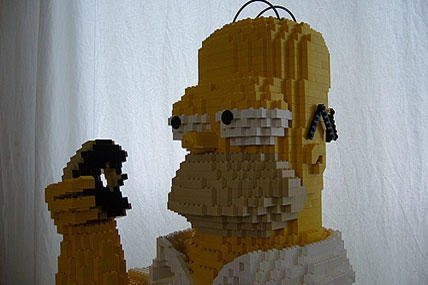In honor of this Father’s Day, we at Credit.com wanted to pay homage to a few iconic TV dads and their credit catastrophes. Why? Of course, because we love them. Also, in taking a moment to celebrate some of the best televised money mistakes, we can learn something and maybe laugh about it along the way. So here’s some advice from your good ol’ TV dads about what not to do with your credit.
Homer Simpson, The Simpsons
He may have been featured in a MasterCard commercial, but Homer Simpson is definitely not a model of financial responsibility. In a season 12 episode, Homer’s credit card is denied at a restaurant. Maxing out your credit card can have a significant impact on your credit score, but that’s not the worst financial offense Homer commits.
In the 20th season, the Simpsons’ home is actually foreclosed upon after Homer takes out a home equity loan saying that he thought the house had to pay back the loan, not him. D’oh! A foreclosure is one of the most damaging items to have on your credit report, so take a lesson from Homer and don’t take all of the equity out of your home.
George Bluth, Arrested Development
The Bluth family may be wealthy, but they have their own fair share of money problems. The series begins with George Bluth being arrested for shady bookkeeping and fraud.
In an early episode, Michael says the family’s finances have been frozen by the Securities and Exchange Commission and viewers later discover that George Bluth was involved in building houses overseas for Saddam Hussein even though Americans are not allowed to do business in Iraq.
While the account freeze would not necessarily show up on a standard credit report, it would show up on an investigative report that creditors will sometimes use. Needless to say, George Bluth’s credit is definitely not “solid as a rock” -- the company slogan thought up by Gob. Thankfully, there’s always money in the banana stand.
Jimmy Cooper, The O.C.
Jimmy Cooper, played by Tate Donovan, may come across as a nice guy compared to his cold wife Julie in the first season of this hit TV drama from the mid-2000s, but he has a dark secret -- money problems. Jimmy comes under investigation by the SEC in the first season for using his position as an investment manager to embezzle some of the money from the portfolios he managed to make up for his own losses.
While he is able to avoid jail time for his crimes, he ultimately is forced to declare bankruptcy. A bankruptcy will stay on your credit report for 10 years after it is reported. That means Jimmy Cooper is only now nearing the end of the repercussions from his bankruptcy, even though The O.C. has been off the air for more than five years.
Mike Brady, The Brady Bunch
Sure, the Bradys seemed like an idyllic family of the ’70s. But even back then, raising six kids, plus paying for a live-in maid, all on one salary couldn’t have been easy. Robert Reed’s Mike Brady never let on that he had money worries, but we can’t imagine the he didn’t. What about paying for college? The price of college has gone up dramatically since the Bradys were in school, but still. Six kids? On an architect’s salary? Plus big trips to Hawaii and the Grand Canyon? We can’t imagine that they didn’t have some debt.
We don’t ever get a sense of the Bradys’ financial situation until the first Brady Bunch movie came out in 1995. A local developer is trying to get the Bradys to sell their beloved home, and eventually learns that they owe $20,000 in back property taxes. This leads to a classic Brady exchange, and the formulation of a very Brady personal finance strategy.
Marcia Brady: [suggesting a way to raise money] I’ve got it! We could enter that Search For The Stars contest! First prize is twenty thousand dollars!
Greg Brady: That’s a great idea, Marcia!
Bobby Brady: Great idea, Marcia!
Jan Brady: Am I invisible? Do I not have a voice? I had that idea two days ago!
Peter Brady: [disgusted] Oh come on, Jan.
Poor Jan.
Dan Conner, Roseanne
John Goodman’s Dan Conner is thought of by some as the ultimate TV dad. He is strong, funny, loving and very human. Roseanne was one of those shows that didn’t sugarcoat the struggles that American families go through, particularly with money. Dan always seemed to struggle with work, first as a construction and drywall worker, but he eventually laid it all on the line when he followed his dream of opening a motorcycle shop.
Both he and Roseanne tried to make the business work, but the shop eventually folded, leaving the family in somewhat dire financial straits, deep in debt and Dan utterly demoralized. In the episode when the shop closes, Dan and Roseanne’s oldest daughter Becky pours salt in a very fresh wound. She’s angry because the closing of the bike shop means her boyfriend Mark has to leave town.
“If you knew how to run a business, he’d still have a job, and he wouldn’t be leaving! Now, I don’t have Mark! I don’t have college! I don’t have anything! You blew it, Dad! You blew it for everyone in this family!”
What a sweet kid.
Tony Soprano, The Sopranos
James Gandolfini’s Tony Soprano was never really hurting for money, and we never got the sense that he was deep in debt, but given that he operated a largely cash business, it’s likely he had some credit problems. If, indeed, Tony didn’t have much of a credit history, he could have benefited from using a secured credit card, wherein he cuts a big check to the credit card company to serve as collateral against the line of credit they provide. That would have helped him establish a credit history.
But let’s be honest, Tony was almost always the creditor, not the debtor. Lots of guys owed him money, and if they didn’t pay, it wasn’t their credit score that took a hit. This provided a level of financial security, if not psychological stability, for Tony, as he once explained.
Anthony ‘Tony’ Soprano Sr.: Sil, break it down for ‘em. What two business have traditionally been recession-proof since time immemorial?
Silvio Dante: Certain aspects of show business and our thing.
Peter Griffin, Family Guy
Peter Griffin, the star of this popular animated show, is a dreamer. He’s a middle class blue-collar worker who aspires, like many of us, to a greater life for himself -- and by extension, his wife, three kids and talking dog. Unfortunately, his schemes toward greatness often get him into big trouble.
In a recent episode, hoping to hit the big lottery jackpot, Peter takes out a second mortgage to buy thousands of lotto tickets. The ploy actually works (ed. note: Credit.com does not endorse this tactic, unless you’re an animated character), but the family lives it up and goes broke. Twice.
The lessons here: Don’t gamble your house on a long shot, even if it worked for Peter Griffin; and even the rich can lose it all if they make bad financial decisions.
Al Bundy, Married With Children
Al Bundy is a defeated shoe salesman who toils away at minimum wage to make ends meet for his wife, two kids and himself. He drives an ancient Dodge Dart. His idea of heaven is sitting down in front of the TV after a long day at work with a beer. No, this is not a guy who spends frivolously, yet he’s accumulated a mountain of debt. Because he’s the beneficiary of the Bundy ancestral debt, passed down from several generations, his credit is already in the dumps. On top of that, his stay-at-home wife, Peggy, is a shop-a-holic -- and she has access to the household credit.
In one episode, he tries to charge a pizza on his credit card, only to find that it’s maxed out -- because Peggy, on a ladies-only trip to Vegas, has just charged $5,000 to it. Oops! Al and Peggy’s argumentative communication style doesn’t lend itself to good, honest discussions about money, so let this be a shining example of why it’s important to be on the same page with your spouse about money and spending.
Image: LEGOFIIR, via Flickr













